
Few icons command the kind of solemn respect of the queer community like Judy Garland. Her life and artistic legacy remain one of the great Hollywood stories–one so complex and varied, few filmmakers or performers have dared try to retell it.
Now Renee Zellweger and Rupert Goold have done just that. Judy, the long-awaited biopic of Judy Garland opens in cinemas September 27. Based on Peter Quilter’s play End of the Rainbow, it focuses on Garland’s disastrous London concert series at “Talk of the Town.”
We meet director and theatre veteran Goold in the hallway of the Omni Toronto, a posh hotel employed as an interview space during the Toronto International Film Festival. Tan and trim, he wears jeans and an untucked flannel shirt he greets us with a smile. He escorts us into a room where Zellweger awaits. Overjoyed, she leaps into Goold’s arms with a squeal upon sight of him.
Zellweger welcomes us as we sit down across from her at the table, her Texas twang everpresent in her speech. She wears a sweater and drawstring pants, yet still manages to radiate the etherial beauty that helped make her a star.
How about we take this to the next level?
Our newsletter is like a refreshing cocktail (or mocktail) of LGBTQ+ entertainment and pop culture, served up with a side of eye-candy.
As part of the Toronto International Film Festival, Zellweger and Goold allotted us a few minutes to chat about Judy, the legend, and how to attract a queer following.
So which one of you was first attached to the project?
RG: We sort of tiptoed together really. Through so much of the process, now when I look back on it, I can’t quite remember decision points. I remember getting my script and meeting our lovely, lovely producer who’s very smiley called David.
David Livingston?
RZ: Yes.
RG: Yeah, he’s a wonderful facilitator of relationships and a lovely writer as well. It sort of all grew together at the same time. So I don’t remember a soft point.
[Laughter]
RZ: I can’t remember.
RG: You might have been thinking about playing it for ages…
RZ: No…
RG: No?
RZ: No! No way!
[Laughter]

Well then what drew both of you to the Garland story? And how did you come to trust one another to the point where you felt comfortable working together?
RG: I’m sure Renee would say this about me, but to a degree, it’s a leap of faith. I think that film is often led by performances, but this is so much the icon and the performance, and that’s a huge risk for Renee and Pete’s [producer Pete Shailaimon] investment for a director to feel he can honor. Of course you can’t know, can you, whether you’re going to get there. You just think can we share a language so we can communicate. That’s the starting point. Is it going to be fun? Because if you fail and it’s still a happy process, that’s still enriching. If you fail and it’s miserable…you don’t want to do that.
[Laughter]
Honestly…
[He turns to Renee]
I don’t know you feel, I sort of feel that I would rather fail and have an incredibly rich process than to succeed in a hollow process.
RZ: Yes.
RG: I think I felt like I guess the diva, the make-up, the extraordinary showmanship diva that is kind of associated with a certain vision of Garland—and not unlinked to some important ideas about drag culture as well—I felt there needs to be an element of that. But there’s a real woman in there. I felt like Renee was going to be that really well. It wouldn’t be a grand Guignol sort of performance.
So Renee, what made you want to play Garland? That’s stepping into some big ruby slippers.
[Laughter]
Wait, I can’t be the first one to make that joke?
RZ: You are.
RG: You are.
RZ: It’s good. Yeah. What appealed to me, apart from the obvious adoration and admiration of her, was why Rupert and David wanted to make the film, and their intention in making the film. I love how he breaks apart the material and looks for subtext in the story in order to conjure an emotional experience. That I love. And it’s interesting how he always wants to put action with the emotion in order to make it palpable. Just the way he described his process…that to me—listen to him talk about characters or story or human experience. He’s a very thoughtful person and a very intelligent person. That was apparent from the start. As he mentioned before, we could have failed at this, but wouldn’t be an extraordinary experience to try?
Related: Watch: Get a look behind the scenes at Renee Zellweger as Judy Garland
I’m glad you mention drag culture. That was a big concern I, and I know others, had going into the film. Judy Garland has been a drag icon for a thousand years. Countless drag queens have done Garland. How do you make sure you don’t turn into one of them?
[Renee points at Rupert]
Really?
RZ: Yeah. He was very clear from the beginning that he didn’t want an impersonation.
Right.
RZ: Also, the focus wasn’t on the drama of the performing icon, but the human behind the persona. The private person filling in the blanks between what you read in the public record and what you might assume a life might be like. Given her circumstances, and considering her circumstances.
RG: Yeah. This is awkward territory, but we had a scene we shot where she hears someone singing “Get Happy” and goes into a club and sees a drag act performing. It was a weird meta scene that was very beautiful, well performed by Renee and the drag artists we were working with. But it was impossible to have two climaxes in the film. I have a lot of respect, I think for the LGBTQ community, particularly gay men. I think there are complex feelings about the “Friends of Dorothy” thing which is quite generational.

True. It is.
RG: Obviously, her relationship with Stonewall and everything that came after Garland was very essential to men of a certain period. Some of the gay men I work with, who are maybe younger than me, writers, actors…in some way they have a problematic relationship to Garland.
How’s that?
RG: I guess they associate…some of them worry about an association with a certain, over-emotive, suffering diva is compromising or marginalizing of their own ability to be in the wider world with respect. And yet equally…one of the reasons I was really drawn to the material actually is a lesbian singer right now who’s writing a musical—she’s only 28 or 29 and a proper badass, which is great. She sent me the “By Myself” TV performance and said it was the greatest performance she’d ever seen a woman give. I was like this is weird. You’re 29, come from an indie background, and for you Garland is an important feminist icon? It’s great.
One thing the film really focuses on is her anxiety, which was exacerbated by her demons of course. Being her is so much pressure. And you, Renee, know about this. An Academy Award, one of the biggest stars in the world for a good decade. One of the most beautiful women. One of the most recognizable faces. That’s a great honor, but it’s enormous pressure. How did you cope with that? And what is it about Garland that made fame so terrifying to her?
RZ: I don’t pay attention to that part of it. I’m not aware of it until I’m in this environment and we’re talking about it, frankly. I feed my dogs in the morning. They need injections. They need pills. I have to give them shots and baths and medications and we go for long walks. I have to vacuum the dust bunnies. I have family things. The septic system gets broken. I have to go to the grocery store. You know what I mean?
It’s your humanity, just day to day life?
RZ: Yes. I have to put gas in the car. I have to return emails. I need to call my mother. So the rest of it…I don’t know. I wear an ugly hat because I don’t feel like doing my hair and it keeps the sun off. Driving in Los Angeles is like being in a mobile tanning bed. That’s existence for me.

So what is it about Garland that existence was so terrifying and taxing? She was someone that, just the pressure of walking on stage and the impulse is to say “Why is this hard? You’re Judy?”
RZ: Well that’s different. We’re talking about a point in her career where she wasn’t sure she could access her instrument to its full capacity as she had in the past. She didn’t want to disappoint people. For decades, she performed at a level that was above and beyond what people experienced in live performance ever before. She’s one in a million years. What if she can’t do that? What does it mean in terms of her identity? And in terms of her bliss and her ability to take care of herself financially? Or her children? There are big implications here. In terms of appearance and molding yourself into a particular beauty paradigm so you’re able to work in the first place, and you’re at the mercy of what studio bosses have determined is marketable, you probably don’t feel like you have much choice. It’s tit for tat. What that means is you’re going to eat soup and not cake.
The weight, obviously, we all know she struggled with because she was so tiny. I have to say also, when it comes to the self-image, I’m glad you guys included the bit about L.B. Mayer touching her inappropriately. That was something she always talked about, but nobody else would ever repeat the story. Nobody would talk about it, even 50 years later. Was that a conscious choice? And why does this keep happening?
RG: We’re all vulnerable in this industry, where you have a huge power balance. Garland, in particular, was not a remarkable looking little girl and she was made a superstar. When you have that power balance, of course, there’s going to be exploitation of that. I think things have improved in the past couple of years, particularly in that they’re addressed more.
Yes.
RG: That scene, I can’t remember exactly when the #MeToo movement started, or where we are in relation to the script’s development. That material we were already working on. I was concerned that we would look opportune; I didn’t want to look like we had crowbarred it in. When Tom and I were talking about the script and the moment, the Faustian pact she makes and understanding the transgression and the punishment. It was a tricky one, because as you say, there’s no hard and fast evidence as is true of much of her life. I read one thing about her getting slapped in the face by [Victor Fleming] on The Wizard of Oz.
That is true, apparently.
RG: Our job is not to be documentary-like. That scene, it’s meant to be creepy as hell where you don’t quite know where the dynamic is. The uncertainty is what makes it disturbing. In some way—grotesque as this is to say—if you know what’s happened to you, you can process that in some kind of way. Therapy, forgiveness, retribution, whatever it may be. But if you don’t quite know, and we’ve all been there, in a gray area where you feel uncomfortable but you can’t quite put your finger on what.
RZ: Yes.

And that’s just another sign of how powerless she was.
RZ: “You have no autonomy.”
RG: There’s something very profound about The Wizard of Oz being our collective childhood. There’s something very innocent, very pure in there, but also something inappropriately adult. Whatever that was, we think of her as a perpetual child, but she was never allowed to be a child.
Now last question. Renee, you have a big gay following. You always have. I don’t know how aware of this you are, but Bridget Jones and Roxie Hart…
RZ: I thought you were talking about my Rolodex!
[Laughter]
I’d love to know who’s in it.
RZ: I was like you are correct.
[Laughter]
Yes sir!
So why do we like you so much?
RZ: Do I have to give why? Can’t I just say “Yay?”
[Laughter]
I couldn’t begin to break that down. But I’m grateful. And I’m glad.
RG: When you think about it…tell me what you think of this. Judy was really funny. Renee is really funny. There’s something about humor. I don’t want to say it’s a point of power, but…

That’s true in that Garland wasn’t afraid to make fun of herself, or her demons. And I don’t think you make fun of your demons Renee…
RZ: All day long.
[Laughter]
I’d love to know what those are.
RZ: I’m closing the door.
You do have a great sense of humor though.
RZ: Can you elaborate on that?
Well, you’re a beautiful, intelligent woman. In all seriousness, I think it’s easy to be pretty. You see people of all genders who are pretty to look at, but they’re boring as hell. It’s another thing to be beautiful and distinct and have something under that which commands attention. You have to be worth watching.
RZ: You can stay all day.
Judy opens in theatres September 27.


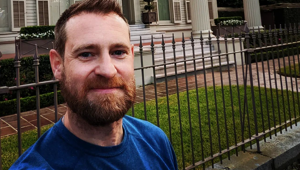
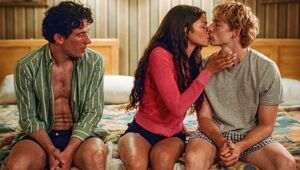
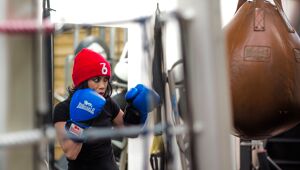
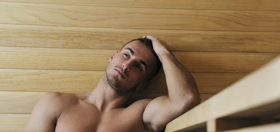

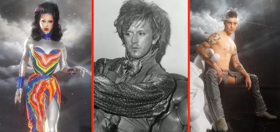
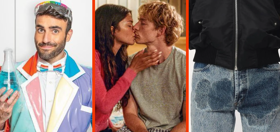

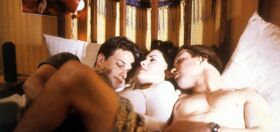
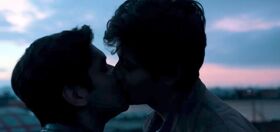

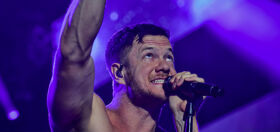



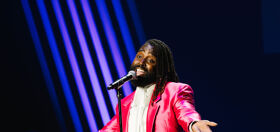
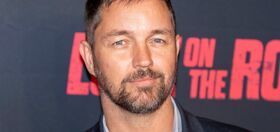
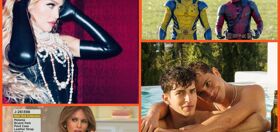
Curtispsf
Wow. I am the FIRST to comment, but I shan’t be the last. I look forward to seeing Renee’s “Judy”.
Josh447
I’ve had my doubts but I’ve always loved her. I hope she slays this. Can’t wait to get my ticket, recline and receive her star power.
Stephen
I was online with a twink that said ‘no one knew about Judy’s death at the time of Stonewall. BS! She died Less than a week before. We all knew. CBS, NBC, ABC, Barbra Walters reported on her! I was 16, queer, sexuality established, bf in school, some nights listening to ritual 8x a night Judy at Carnegie Hall. We knew because knew. Bought three sets of the double album!
Mae West and Judy Garland were the only celebs openly identifying in print their gay fans. They both said “they are bigger, louder, more generous and loyal.”
I saw the film. Will see it again. 1-2 times. I wan5 to see if it was wha5 I brought as expectations o4 if the film had 33% damn good acting and writing.
But the script is a bio pic flashing back and forth. Damn that’s disturbing. We all know the back stories of pills, machine like 18+ hour filming days. The creeps groping inappropriately. (Shirley Temple was hit on by at nine years old by one of many pedophile producers as her mother flew through the doors and saved her child.).
The real story by 2 of her gay now mature friends from San Francisco were great friends. Neighbours, and after a martini or 6 would spill the tea. The horror story of Judy’s mental decline was beyond description. She was very broken. And singing through thru pills, mental endless fighting for survival, memory loss, alcoholism, addiction, financial thieves preying on her for decades, emotions buried deep and flash across my memory in song she was method story teller on stage. She was one of many women ignored by the people that resented her self-determination and guts & glory … winner take all, bust or win, never long enough to enjoy her own life and career.
She craved humanity, human contact, compassion. But to reinvent herself? She was a ground breaker. But the darker side … Shows in Scandinavia we’re so bad people booed her off the stage. She once blacked out four songs in.
Her life was held together with thinning threads … she lived just to mother 2 small children. The long term damage was too much and she burned out at 47 exhausted by a hard life.
She was a staple of the parties thrown by the Rat Pack. But they feared having her onstage at Vegas because she’d steal the show.
She once cut her arm to the bone to get sympathy from an agent to keep him with her alone on tour as the sole heterosexual man. He was married. Not interested. It destroyed his marriage. His wife wrote a scathing book about how high maintenance Judy was. It’s in the dump. 60 to 70 pages in I wanted to throw up. Som3 stories are too hard to forget. We don’5 need to know their worst moments as it steals our adoration to Judy with shocking dark moments. The movie doesn’t touch the dark of the soul events and nights of Judy. I am glad o& it. That# tabloid entertainment. Thriving on the lies … or real sufferings of others.
There were no rehab centres to get cleaned up in. AA was not as mainstream and was yet to have its many celebrity private meeting. Then Betty Ford Centre.
.It was an eat or be eaten world where she re-created touring in concert in a big way. Created permanent and arrangement creativity with a TV show style of singing 2 songs at the same time. She was chastised by TV producers for touching guests too often. Her 2.5-3 minute talks before performing with Ethel Merman, Ella Fitzgerald, Barbra Streisand, Ray Bolger, etc.
Her post Nov 22 (death of JFK) TV episode with no guests just a huge big series of inspirational songs in a TV one woman show. National anthems and uplifting the countries hearts in grief. We were sent home Nov 22 in Canada when we heard at noon JFK was assassinated. He was everyone’s president in Canada and USA and the world.
A One woman concert on TV as a tribute to a slain president! New idea!
Two years of Mel Torme conducting and co-creating WITH Judy. She was serious and difficult, vulnerable beyond others, potent and real in her way.
She changed rules about performers, actors and having a good time. She was ‘one the girl’s that was just one of the boys!’ She had power when no one respected a woman to be respected. She was great, good, fair and sometimes just awful onstage. She was breaking down with TV cameras in her home doing a week in the life …. and delusion-ally terrified of every room thereafter* she knew the cameras were there too! She did the Oscar nominated role of a German woman being grilled in the Nuremberg Trials. Her breakdown was operatic @nd jaw dropping. Her thyroid issues, she’s obese, but the child in the character was 9 years old at the same time. Judy’s vulnerability was a two edged sword of Damocles.
She performed her last year with a broken spirit, a broken body, the guts of a rhino and the wounded heart of a survivor thrown out by the film system that disabled her.
So if we know that …. why move past to present to past to present? That was an emotional roller coaster. Her story is enough in the last few months without filler for context. A linear story line developed from true testimonies from people that saw her best and worst could have been a great script. But again Judy was edited and reduced and redacted.
Grieving? Hell yes. We were broken. A patron Sain’s wings were torn off. Mafia owned bars from Vancouver to Montreal to LA to NYC and police pushed too hard. Drag Queens were on Stonewalls front line. … until Barbra
They did a Judy impersonator but if a drag performer did use their own voice with other singer/stars, they never tried Judy’s music. Lip sync only. You could not find the emotional intelligence & vulnerability in anyone else.
It was love and loyalty. No one could move your heart so deeply. And laugh so quickly mid song when she freestyler through forgotten lyrics onstage. It’s an homage. It’s a history biopic for people too young to know history on how Hollywood and Women and women in Alberta, Texas or Ohio were dismissed. Sadly, women were used and abused. It is a testimony to her enduring iconic place in our hearts and minds.
I thank Renee was great in the preview. 10/10 great acting. 6/10 script. Big fat Oscar loving nomination, for sure! Nostalgic Oscar votes could have her as a front runner. But who cares. It’s a fan film dripping with emotions, tears, music, fine performances ….. and for a few moments and I really felt her on the screen, channeled, but she was back! Renee, it was so real!
Judy was a Powerhouse at her best! I had a few tears. Proud of them. When I was not annoyed by the flashbacks. And it’s a great homage to the human, the mother, the warrior, the self reliant working Mom, the Star so bright it burned into your heart with sympathy and empathy & respect ?!
To little girl in gingham in those red ruby shoes worth now 7-8$ million per pair. All 7 sets of them. Always trying to get home. But never in her own mind able to find a baseline of security.
Renee, you got guts. I hope you get some glory too. Damn good acting and singing. It’s memorable. Rami in Queen’s story, and the equally good new film, Rocket man. Right now we need real hero’s, dead or alive as we struggle in the lowest base of cynics and liars that run the news, the government and fat egos with no substance. We crave reality and vulnerability. Integrity. Judy was human. We knew it. We loved her more because of it. Wrote too much. B3cause ai remembered illegally bought ID cards so I could get into gay bars at 16 in 1968. No one cared. Chicken was passed around. & I was so hot for 15 minutes!
Judy was hot for 50 years!
Michael007
That was one hell of a story there! Thanks for such professional writing.
socaliscorpio
awesome interview, i can’t wait to see this film !
ricdardc1
I heard she was doing this and thought what the hell. then I saw the promos. I can’t wait. She is an Icon for all, But I can’t stand Flashback movies. I wish they would have given us a straight linear paced movie. I Thought the same thing when I heard Gal Gadot was playing Wonder Woman , I thought she could never fill Linda Carters Boots. I was Shocked how much she did a better job.